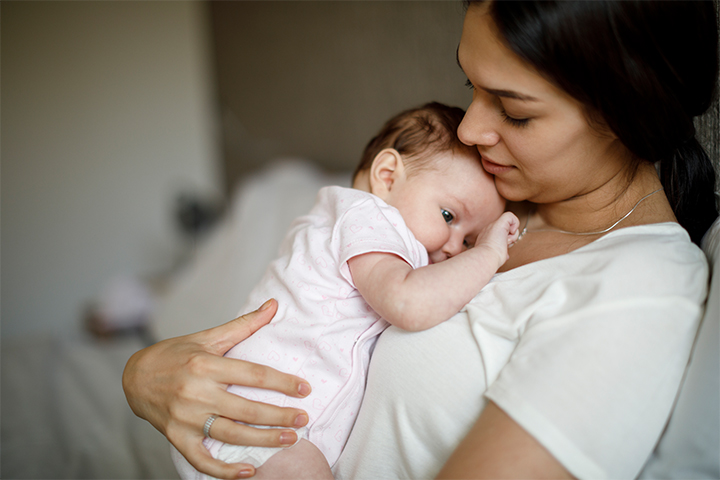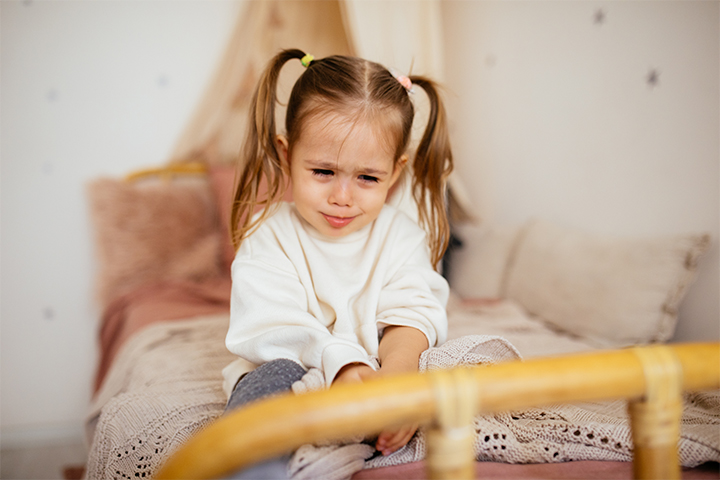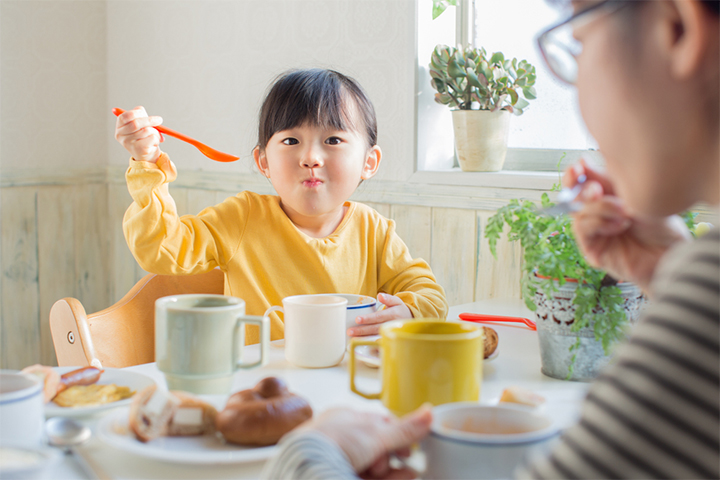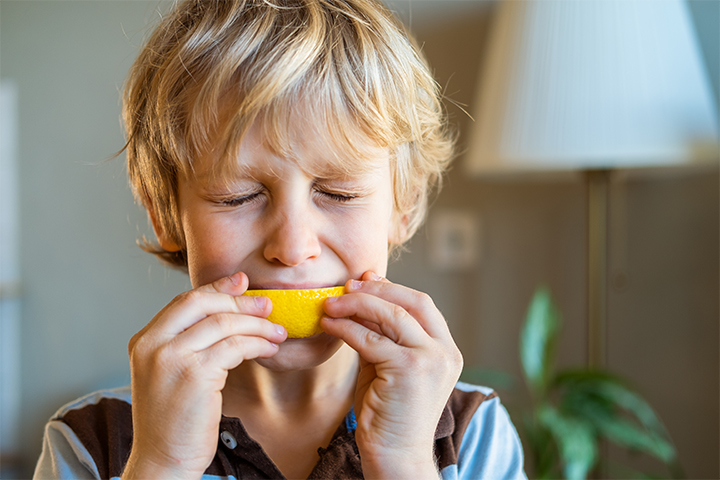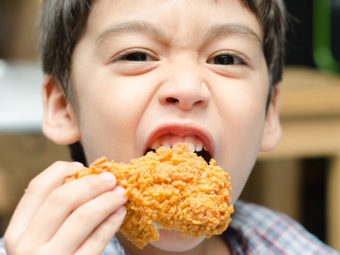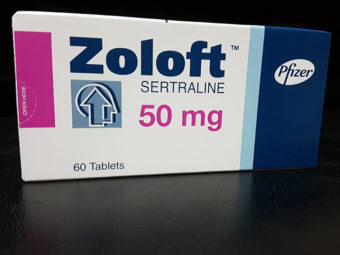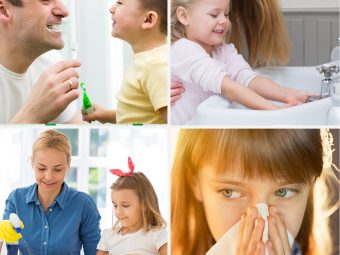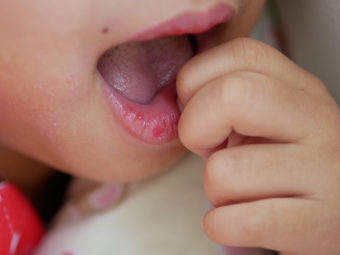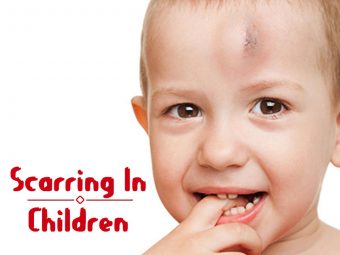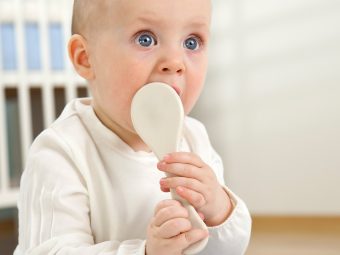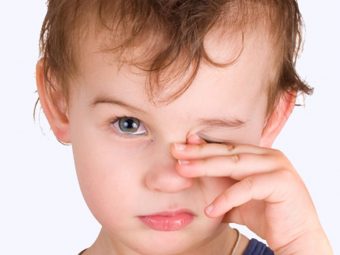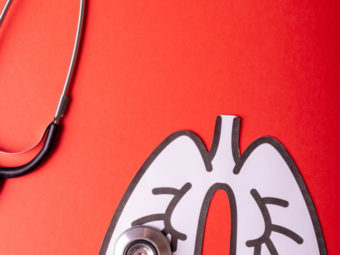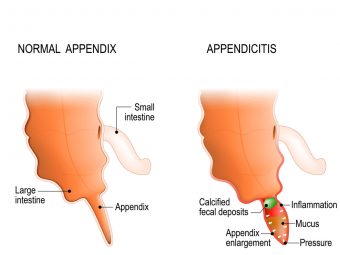
Image: ShutterStock
Hiccups are innate, involuntary reflexes that could begin in the womb at just nine weeks ofgestational ageiX从最后一次月经周期计算铜rrent date in weeks(1). Though they aren’t a cause for worry, hiccups in kids can be bothersome since they can disrupt what they are doing and make them fussy and irritable.Hiccups are caused by the contraction of the diaphragm, the dome-shaped muscle located below the lungs.
They are generally self-limiting and go away on their own in a few minutes. However, though adults are usually willing to wait for a hiccup episode to pass, children aren’t. Hence, parents need to be equipped with remedies for managing hiccups quickly. If your child is prone to frequent bouts of hiccups, continue reading.
This post tells you about types of hiccups, their causes, and home remedies that could help manage hiccups in children.
Are Hiccups Good Or Bad?
Image: IStock
Hiccups are pretty common in children and shouldn’t be a cause for concern. A recent study conducted on newborns suggestshiccups maypromotebrain developmentand help regulate breathing(1).The researchers believe that the hiccups trigger brain signals that help babies learn how to regulate their breathing.
However, persistent hiccups could indicate an underlying disorder. If hiccups affect the child’s ability to eat, breathe, or sleep, consult a doctor.
Types Of Hiccups
Hiccups can be classified into three types based on the duration of each episode(2)(3).
- Hiccups that last for a few seconds or minutes are calledtransient hiccups.
- Those that linger for 48 hours to one month are termedpersistent hiccups.
- Hiccups that last for more than a month are termed intractable hiccups.This type of hiccups is rare and usually seen only in adults.
Persistent and retractable hiccups can lead to certain complications and affect the child’s quality of life(4).
Causes Of Hiccups In Children
Image: Shutterstock
The following are some of the most common triggers of childhood hiccups(5)(6)(7):
- Eating or drinking too much
- Eating or drinking too fast
- Eating spicy foods
- Drinking carbonated drinks
- Drinking ice-cold water or very hot water/ beverages alternately
- Indigestion
- Stress
- Bad odors
Besides these common causes, hiccups can also be triggered by
- GERD (gastroesophageal reflux diseaseiXA disorder in which the stomach contents move up into the mouth) wherein the stomach fluids flow back up into the esophagus(8).
- Strong emotions, such as excessive excitement.
- Over tiredness.
In some extremely rare cases, hiccups are a symptom of an underlying health condition that affects the esophagus, lungs, brain, or stomach(4).Hiccups can also be caused due to a side effect of surgery or certain medication.Hiccups due to these factors could prolong for a longer duration and can disrupt the child’s everyday activities.
When To See A Doctor?
Image: IStock
If you notice any of the following conditions in your child, consider it serious enough to warrant a visit to the health care provider.
- If a bout of hiccups stays for longer than 24 hours, and it upsets your child or interferes with their everydayactivities, talk to a doctor and learn ways to handle it.
- If the hiccups last longer than 48 hours, you should see a doctor.
- Intractable hiccups in infants or toddlers that last more than a month are uncommon, so if your child experiences it, visiting the doctor is a must.
- See a doctor if you noticedrastic weight lossin the child orinsomniaiXA sleep disorder characterized by difficulty falling asleep and staying asleepthat you believeis connected to hiccups.
Make a note of any other symptoms that the child may exhibit. If your child is on medication for any other conditions, do mention that to the doctor.Uncontrolled hiccups can be a symptom of some serious ailments, a side effect of some kinds of medications, and also an indicator of a foreign object inthe ear(2).
How To Stop Hiccups In Kids?
Image: Shutterstock
You can prevent frequent hiccups in your child by taking a few simple steps. Note that these steps are generally recommended for shortening bouts of transient hiccups and not for treating persistent and intractable hiccups(2).
- Ensure the child does not gulp down food too fast.
- Teach the child to chew well before swallowing.
- Tell them to sip drinks slowly.
- Teach your child the habit of drinking straight from a glass
- Avoid using straws.
- Prevent your child from eating very hot and very cold foods alternatively.
- 避免过食你的孩子,如果他们是旧的enough to eat on their own, ensure they do not overeat.
Different people handle hiccups in different ways. If you are outside and are caught unawares, you can ask your child to try any of the following ways to manage hiccups:
- Drink a glass of water
- Hold their breath for as long as they can
- Breathe into a paper bag. Note that they should only use a paper bag and avoid plastic bags
- Take slow, measured breaths
- Ask them to put their head in between their knees, as far as they reach, to put pressure on the diaphragm.
- Try to distract them
You could also startle the child or give them a fright. Take care not to traumatize the child. The goal is to surprise them so that they get distracted from the hiccups. Some parents tickle the little ones instead of giving them a fright, which could be effective too.
Home Remedies For Hiccups In Children
Image: IStock
Hiccups in children are such a common occurrence that experienced parents usually have home remedies at hand. These simple, safe treatments for hiccups can help you soothe the child and avoid doctor visits unless it is a case of persistent or intractable hiccups (6).
- Putsomething sour, such as a slice of lemon,in the child’s mouth and ask them to suck it.
 Quick tip
Quick tip- Putsugar under the tongue. Instruct the child to leave it for five to ten seconds before swallowing it. Other sweet foods, such as peanut butter or honey, are also found to work well in some cases.
- Let the childdrink something hot or cold. This helps if the bout of hiccups has been triggered by a drastic change in the stomach temperature.
- Let themdrinkwater slowly
- Give themice chips.
- A gentle massage on the child’supper stomachis also a good option. Remember to move yourfingers in downward movementsand be very careful not to hurt the child by pressing too hard.
- Drinkingfennel, peppermint,orchamomile teaiXMade from the chamomile flower and is used for treating anxiety and insomniaworks wellwith muscle spasms. Use a dropper to put the drink into your young child’s mouth.
- Get the child togargle ice-cold waterfor half a minute. If the hiccups persist after one round, the child can repeat this.
Frequently Asked Questions
1. What happens when a child hiccups?
During hiccups, the diaphragm closes and is immediately followed bylaryngeal closureiXA procedure to block the entrance of food into the lungs and larynx or the voice box. This causes a sudden rush of air into the lungs. It makes a “hic” sound since the vocal cords are closed now (10).
2. Are frequent hiccups a symptom of anything in children?
Frequent hiccups can be a symptom of brain lesions, liver and kidney problems, tumors, intestinal diseases, oruremic poisoningiXA disorder leading to the presence of too much waste in the blood due to kidney dysfunction. It can also be due to unknown resins or irritation due to surgeries or drugs (11).
3. Is it normal for children to get hiccups multiple times a day?
Children can get hiccups multiple times a day due to various reasons. This can be due to an underlying condition, overeating, or eating too fast (12).
4. What causes random occasional single hiccups in children?
Minor irritations can cause an occasional single hiccup in children. Single hiccups can be associated with strong emotions or eating or drinking. This may also occur without any obvious reasons (13).
5. Do hiccups mean children are growing?
Hiccups are not an indicator of growth in children. Some anecdotal beliefs from the past say hiccups mean a growth spurt in children, but these are not true (14).
Hiccups in kids are common. Eating or drinking too much or too fast, eating spicy foods, and indigestion are some of its common causes. Unless hiccups are occasional and brief, they aren’t a cause for concern. However, consulting a doctor is preeminent if hiccups are becoming too frequent and interfering with your child’s daily activities. Sucking something sour, such as a lemon slice, drinking something hot or cold, and gently massaging your child’s stomach are a few ways to relieve your child from transient hiccups.
Infographic: Questions To Expect At The Doctor’s Visit
Hiccups in children may seldom be a concern. But if it interferes with your child’s daily activities and causes discomfort, you must take them to the pediatrician. This infographic will help you prepare for the doctor’s visit by filling you in on the common questions you may be asked. Take notes and prepare the answers for an accurate and smooth diagnosis.
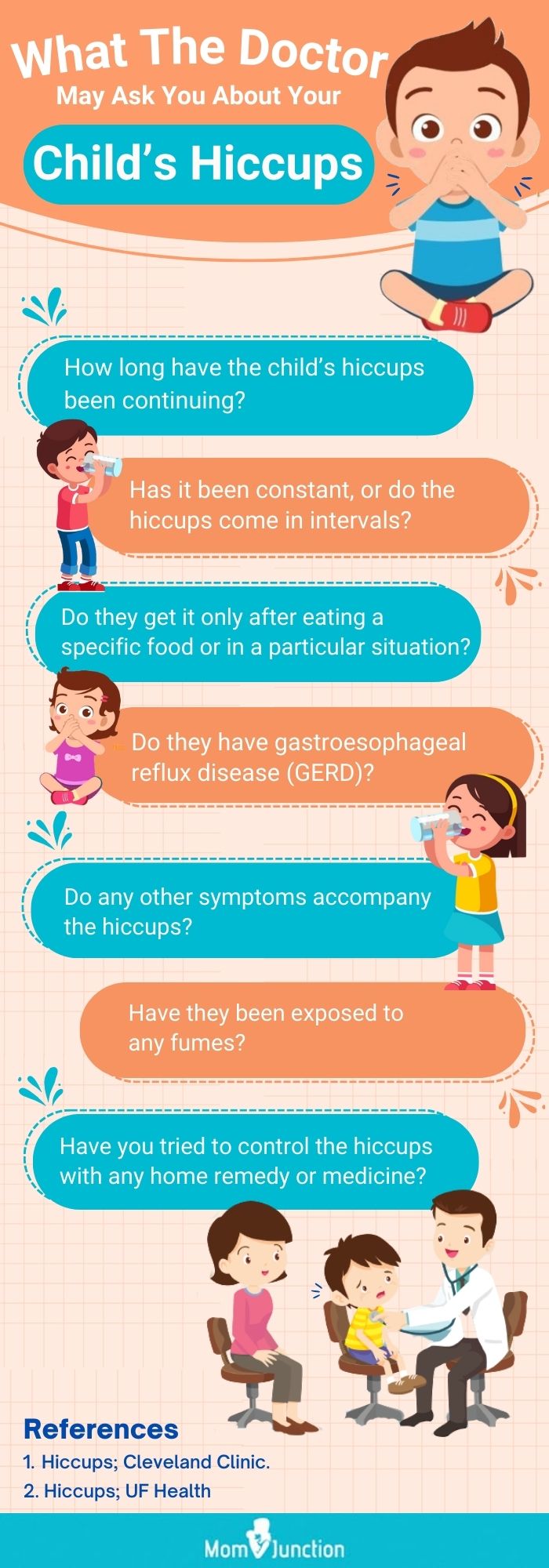
Illustration: Momjunction Design Team
Get high-quality PDF version by clicking below.
Download Infographic
Key Pointers
- Hiccups in children are common and are believed to aid in breathing regulation.
- Children may experience hiccups due to acid refluxes, stress, or eating something spicy.
- If hiccups persist longer than usual or are accompanied by abnormal weight loss, it can indicate an underlying issue.
- Certain home remedies such as drinking water slowly or sucking on a lemon may help cope.
References:
2. Juan Brañuelas Quiroga, José Urbano García, and Julio Bolaños Guedes;Hiccups: a common problem with some unusual causes and cures; British Journal of General Practice (2016).
3. Ju Hwan Lee, et al.;Treatment of Intractable Hiccups With an Oral Agent Monotherapy of Baclofen -A Case Report-; The Korean Journal of Pain (2010).
4.Chronic hiccups; Genetic and Rare Diseases Information Center (GARD)
5.What causes hiccups?; Harvard Health Publishing
6.Hiccups; BetterHealth Channel
7.Hiccups; NHS
8.GERD (Gastroesophageal Reflux Disease) in Children; John’s Hopkins Medicine
9. Full-Young Chang and Ching-Liang Lu;Hiccup: Mystery, Nature and Treatment; National Library of Medicine (2012)
10.Hiccups, Chronic; National Organization For Rare Disorders
11.Child hiccups are seldom cause for alarm; OSF Healthcare
12.Hiccups; National Health Service
13.Why Do You Get Hiccups? (And How to Stop Them); Cleveland Clinic
14.Hiccups in Children: Care Instructions; Kaiser Permanente



